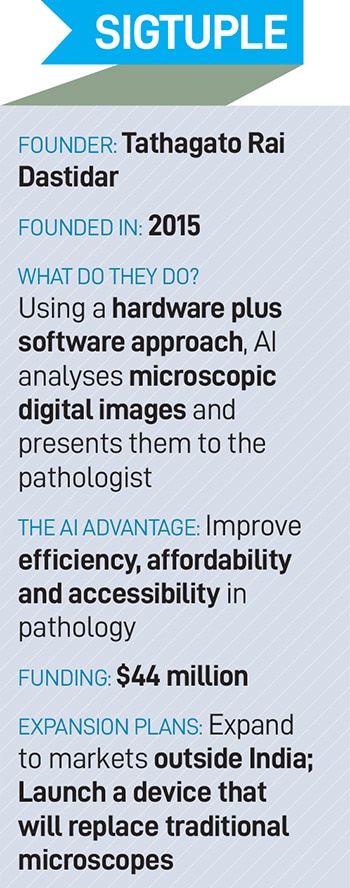SigTuple's cutting edge AI tech hopes to democratise diagnostics
The startup's solution helps pathology labs improve efficiency, accuracy and accessibility


[br]
Tathagato Rai Dastidar was looking for areas to build his startup. Despite having no background in the space, healthcare fascinated him. Around 2015, while researching, he stumbled across a problem in the field of pathology. “In pathology labs world over, there were machines to do almost everything. But for samples of diseased patients, there was no affordable device available," says Dastidar. The most crucial part—analysing an unwell patient’s blood—had to be done manually by a pathologist under the microscope. “Analysing blood manually, even by a pathologist could be highly error-prone. So, we decided to address this issue using AI," adds Dastidar.
After six years of intensive research, SigTuple started commercialisation in 2021.
After a patient’s blood is drawn and reaches the laboratory, it goes through an automated machine called the ‘cell counter’. Dastidar explains this gives all the numbers and their respective ranges if all the numbers are within range, the report comes in accordingly. If a certain number is beyond or lower than the set range, a slide needs to be made that will be verified and analysed under the microscope. Today, it is being done manually, SigTuple is automating this process.
SigTuple offers a two-part solution—called AI100—that is sold to laboratories and hospitals. One, an automated digital microscope, which converts the physical sample into microscopic digital images. Second is an AI-driven software, which analyses these scans and presents it to the pathologist on a web browser. “We are selling the technology at a more affordable price, as compared to the others available. That"s why less than 4 percent of labs worldwide have adopted this technology," he says. The startup claims to have 21 granted patents for this technology—of which six are US patents and the remaining Indian.
With this two-pronged approach to diagnostics, the chances for error are minuscule. Also, it saves a lot of time—what would take a technician five or ten minutes can be completed in less than a minute, since the AI has done over 95 percent of the job. The pathologist simply needs to verify, review and sign off. "We are improving the quality, turnaround time and the accessibility," he says. Both the software and hardware have been designed and developed by SigTuple in-house. Some of their clients include HCG Hospitals, Krsnaa Diagnostics and Thyrocare among others. "We charge an upfront cost for the hardware and there is a recurring charge for the usage of the software," he explains.
 One of the major challenges that any diagnostics provider faces in setting up quality diagnostic centres outside large urban areas is the availability of trained personnel. “In the absence of qualified personnel at site in laboratories outside urban areas, these samples need to be shipped to central reference laboratories for review. With AI100 now present across our diagnostic labs, doctors can leverage the AI-powered tele pathology platform to approve reports within minutes," explains Manish Dattatraya Karekar, COO, lab operations, Krsnaa Diagnostics. The company has deployed the technology across their labs in Maharashtra, Punjab, Himachal Pradesh and Odisha.
One of the major challenges that any diagnostics provider faces in setting up quality diagnostic centres outside large urban areas is the availability of trained personnel. “In the absence of qualified personnel at site in laboratories outside urban areas, these samples need to be shipped to central reference laboratories for review. With AI100 now present across our diagnostic labs, doctors can leverage the AI-powered tele pathology platform to approve reports within minutes," explains Manish Dattatraya Karekar, COO, lab operations, Krsnaa Diagnostics. The company has deployed the technology across their labs in Maharashtra, Punjab, Himachal Pradesh and Odisha.
The founder claims that A100 also has a far better throughput, as compared to competitors. SigTuple claims their solution can process around 20-25 blood samples per hour, and close to 40-50 urine samples per hour. In FY23, the company clocked in a turnover of Rs 10 crore and hopes to double that in the coming year.
So far, the startup has raised a total of $44 million from investors including Accel Partners, Chiratae Ventures, Endiya Partners and pi Ventures among others. “We invested in SigTuple for the first time six years ago, far before the hype in AI in healthcare. As a doctor, I felt AI will see the initial take-off where images are involved. Ninety-nine percent of the images in pathology are still in an analogue form even now. I am sure AI in pathology will help in improving access, affordability and accuracy," says Ramesh Byrapaneni, managing director, Endiya Partners.
The Bengaluru-based startup has been working in the Indian market so far, but it has the clearances to sell in Europe, Africa and most of Asia. "We are in the process of onboarding distribution channel partners. For now, we are concentrating on Southeast Asia, Middle East and North Africa. Our next priority would be Europe and North America," he adds.
On the R&D front, Dastidar has grand plans to launch a device which can replace the traditional microscope. A100 solves for blood microscopy and urine microscopy in small and medium laboratories. “We are working on a device, which can address all the needs of a microscope in large laboratories too—from biopsy analysis to pap smears. Interestingly, many of these still don’t have affordable digitised solutions," reckons Dastidar.
Eventually though, Dastidar wants to launch a device which does blood analysis at the doctor’s chambers or a public healthcare centre—making it as simple as checking blood sugar on a glucometer. “My vision for SigTuple is to completely decentralise diagnostics."
First Published: Jun 27, 2023, 09:44
Subscribe Now